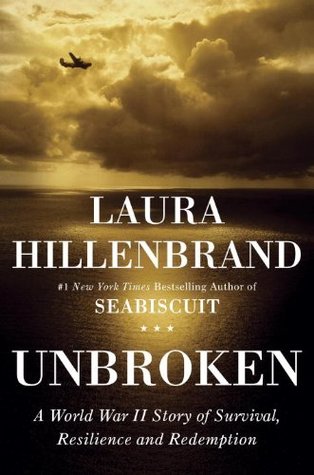I'm not typically one to read nonfiction books. I usually like to stick to fiction, sci-fi, fantasy, and the like. So, in short, this book was a little out of my usual genres.
My mom came to me after she'd read Unbroken and told me I needed to read it. I'd done a research project on internment camps in America during World War II and presented on the cruelties on American citizens of different nationalities. Unbroken is a story of the other side, about the bombardier on the plane The Green Hornet--Louis Zamperini--and how he is captured by Japanese forces, imprisoned, and later freed.
The Rundown:
Violence: This is a war story, so expect some deaths, injuries, etc. Fellow pilots and flight crew die. While imprisoned, Zamperini is beaten, starved, and tortured. After freedom, he has murderous thoughts over his captors.
Swearing: I don't remember much anything other than damn, hell, and a few other milder words that some people may find offensive. It isn't overwhelming.
Sexual Content: Not a worry, though men in barracks together during flight training post pictures of women on their bathroom walls.
Synopsis:
Unbroken is a story set in World War II era. It begins with Louis Zamperini, a young troublemaker who uses his speed to steal and cause problems. At the height of the practice of eugenics, Zamperini was in danger of being labeled as undesirable, and his brother helped him instead put his speed into running for sport.
Zamperini became an Olympic runner, setting records throughout his young career. When World War II arrived, he enlisted in the Air Force.
After training, Zamperini's plane was shot down over the Pacific. Almost all of the crew, except three, died in the crash. The three men were adrift for 47 days before being picked up by Japanese forces, the longest any man had drifted in a raft. Zamperini is then placed in a prisoner of war camp, where he is beaten, starved, and nearly killed multiple times.
My Thoughts:
Since this wasn't a type of book I typically read, I don't have much to compare it to, but I thought it was excellent if you want to venture outside of your normal reading genre, or if you enjoy this era. Lauren Hillenbrand isn't afraid to write about the horrendous things the Japanese did to POWs, acts that America tends to downplay. I think that is what I love most about the book--the fact that Hillenbrand tells it like it happened. She doesn't skip, she doesn't overemphasize. She tells the truth as she heard it from her research.

No comments:
Post a Comment